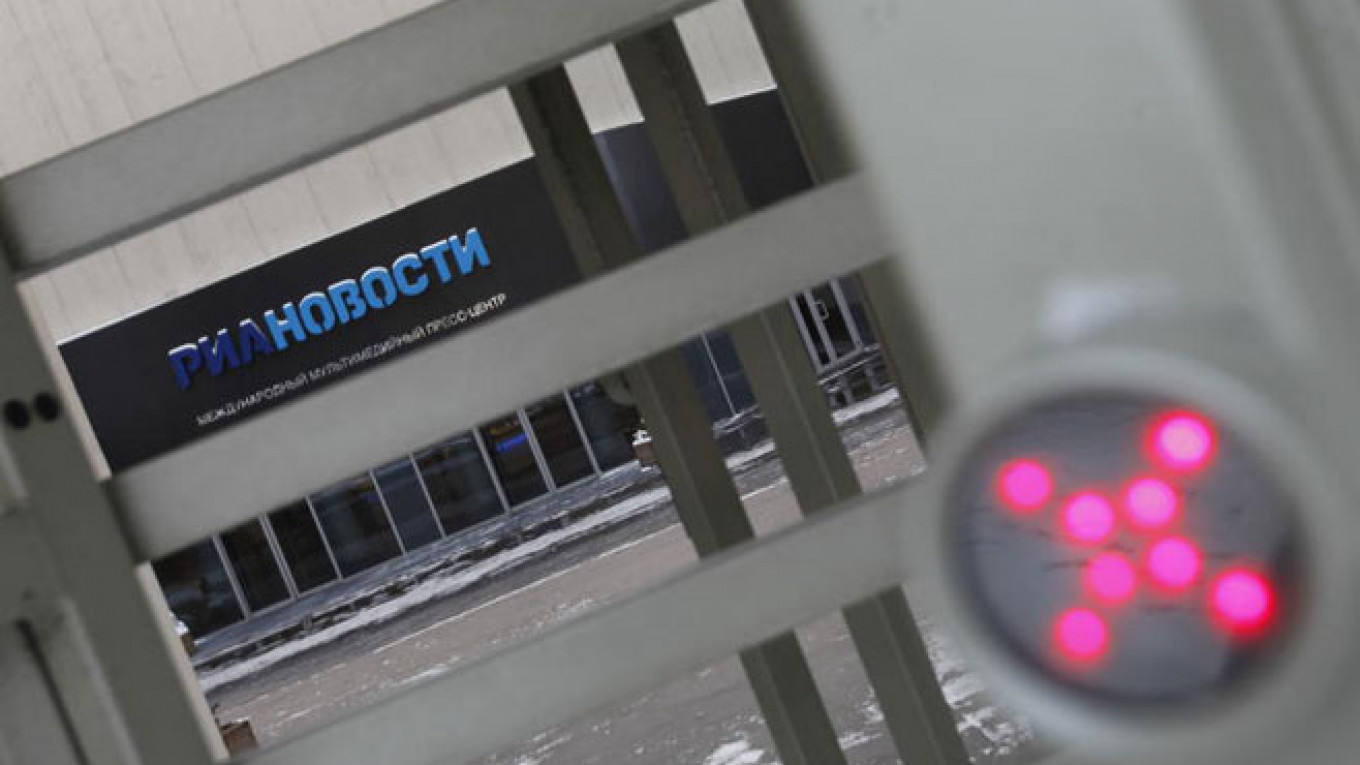RIA Novosti, Russia's largest state-owned news agency, is undergoing the final stages of its liquidation three months after President Vladimir Putin decreed its dismantlement and mandated the creation of Rossia Segodnya, a global news agency to be headed by a Kremlin loyalist.
New details regarding the structure of Rossia Segodnya emerged Tuesday, while a RIA Novosti representative said that a statement about plans for the agency would be released in the coming days.
Putin announced last week that Rossia Segodnya would become one of Russia's "strategic enterprises," adding it to an elite club of state-owned and private companies viewed as vital to the country's national interests, but it will likely be a smaller operation than its predecessor — nearly one-third of RIA Novosti's employees have been clearing out their work spaces in recent weeks.
"There was an 'end of term' atmosphere in the office last week," said a former RIA Novosti employee who wished to remain anonymous to honor her contractual obligations with the agency. "The work did not stop but it slowed down. We were working as if we were about to leave on a summer break."
Before its liquidation, RIA Novosti employed 2,300 people, including 1,800 full-time employees. The agency will be losing about 1,000 staff members, many of whom have decided not to join Rossia Segodnya because of ideological differences with the new management.
"We were asked whether we wanted to be part of the new company," the former employee said. "Those who did not, out of principle or for other reasons, will be receiving compensation and were given flexibility about a departure date."
Financial circumstances and the need to better "highlight the state policies and social life of Russia abroad" were stated as motives behind the dismantlement of agency, but analysts interpreted the move as a ploy to further tighten the Kremlin's grip on Russian media.
When decreeing the dismantlement of RIA Novosti in December, Putin also appointed popular show host Dmitry Kiselyov, considered a Kremlin propagandist by political analysts and observers of the Russian media scene, as head of the new organization.
Kiselyov is notorious for his incendiary comments and is known for his denigration of the West and his praise for Stalinist policies. Last August, in one of his most controversial statements, he said the hearts of homosexuals should be "buried or burned" if they were to die in an accident.
But he has received strong praise from the Kremlin, being awarded the prestigious Order for Service to the Fatherland in February for his "services in the humanitarian sphere, strengthening of the rule of law, protection of the rights and interests of citizens, and many years of diligent work," among other achievements.
Alla Nadezhkina, press secretary of RIA Novosti, told The Moscow Times on Tuesday that an announcement regarding the new official structure of the agency was imminent.
"We currently do not know the exact parameters of the organization's new structure," she said. "The management is currently preparing a statement that should be released in the very near future."
Nadezhkina also said it was unclear when the organization's new name would be adopted.
"At this moment, we are still RIA Novosti and are working within its structures," she said.
A current RIA Novosti employee who wished to remain anonymous for fear of being reprimanded said that employees have been "kept in the dark" since the announcement of the agency's liquidation in December and that the management seemed unaware of how restructuring would affect its work.
The reorganization of the agency, partly aimed at targeting an international audience, will also affect coverage of Russian regional news. Rossia Segodnya will maintain 19 of RIA Novosti's 69 regional offices and will retain the services of only 20 out of the 150 journalists working on regional stories, Vedomosti reported Tuesday.
The agency's new editor-in-chief, Irakly Gachechiladze, said the reforms geared toward creating an international news platform will prevent overlap with the domestic coverage of Itar-Tass, the other main state-owned news agency.
According to a report by RBC, citing anonymous sources within RIA Novosti's sales and marketing divisions, the downsizing of the agency could cause it to lose at least a third of its revenue.
But Rossia Segodnya will be propped up by 5 billion rubles in state funding for 2014 and 2015. Voice of Russia, a state-owned broadcasting corporation which will fall under the control of the new agency, will also receive 4.4 billion from state coffers for 2015 and 2016.
Contact the author at g.tetraultfarber@imedia.ru
A Message from The Moscow Times:
Dear readers,
We are facing unprecedented challenges. Russia's Prosecutor General's Office has designated The Moscow Times as an "undesirable" organization, criminalizing our work and putting our staff at risk of prosecution. This follows our earlier unjust labeling as a "foreign agent."
These actions are direct attempts to silence independent journalism in Russia. The authorities claim our work "discredits the decisions of the Russian leadership." We see things differently: we strive to provide accurate, unbiased reporting on Russia.
We, the journalists of The Moscow Times, refuse to be silenced. But to continue our work, we need your help.
Your support, no matter how small, makes a world of difference. If you can, please support us monthly starting from just $2. It's quick to set up, and every contribution makes a significant impact.
By supporting The Moscow Times, you're defending open, independent journalism in the face of repression. Thank you for standing with us.
Remind me later.






